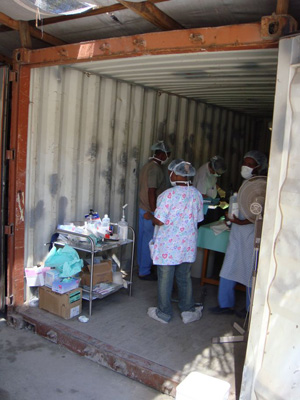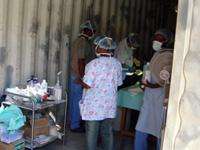MSF continues to focus primarily on providing medical services in hospitals and clinics in Haiti, but teams are also adapting to the evolving situation on the ground.

Haiti 2010 @ Benoit Finck
A shipping container-turned-medical facility in Port-au-Prince.
Doctors Without Borders/Medecins Sans Frontieres (MSF) continues to focus primarily on providing medical services in hospitals and clinics in Haiti, but teams are also adapting to the evolving situation on the ground.
In Port-au-Prince, for instance, surgeons at the two school buildings now serving as the “New Carrefour Hospital”—the quake and its aftershocks rendered the original hospital unsafe—performed 40 operations on Wednesday. In the Carrefour Feuille neighborhood, where 9,000 people are living in temporary shelters, a team consisting of two nurses, a doctor, and an obstetrics specialist are running a clinic in a tent, tending to both people with injuries from the quake and also people afflicted with diarrhea and fevers.
In area called Delmas 30, a post-operative “village” has been assembled in tents, a place people who were operated on elsewhere can rest and recover. Brigg Reilley, an MSF epidemiologist in Haiti, says such facilities are crucial for the vast numbers of post-op patients, both in the short and long-term: "The most serious cases are going to continually need dressing and regular cleaning, all part of a very nursing-intensive process. We're eventually going to need skin grafts and prosthetics. These will be needed not only in the next days, but in the coming weeks, months, and beyond. Even after the current media spotlight on Haiti fades, there will be patients with extensive orthopedic needs as a result of the earthquake."
Similar services are available in a former kindergarten known as "Mickey” that is now a 60-bed facility. There are another 30 beds in Bicentenaire, and a former secondary school in the Champs Mars area is now a clinic that will provide inpatient accommodations as well. Outside Port-au-Prince, in the hard-hit town of Jacmel, MSF is working with the local hospital to provide care in their building and in tents surrounding it.
MSF has also brought in the staff and equipment necessary to provide water to some of the communities in which we are working. A new clinic has opened in Grace Village, for example, and the team is taking responsibility for supplying water to the 15,000 people in the area. Near the Chancerelle Hospital, MSF is using water bladders to supply a community that is camped in the open. A similar project is underway near kindergarten Mickey.




